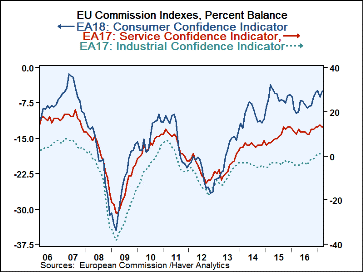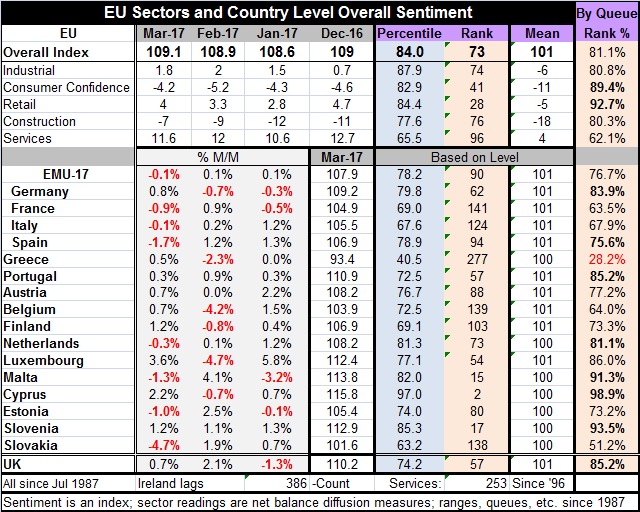 Global| Mar 30 2017
Global| Mar 30 2017EU Index Rises but EMU Activity Index Falls in March
Summary
The EU Commission indexes for March show an advance for the EU as a whole and a small 0.1% drop for the EMU. The EMU gauge has risen by 0.1% in each of the two prior months. The level of the EU-wide gauge has an 81st percentile [...]
 The EU Commission indexes for March show an advance for the EU as a whole and a small 0.1% drop for the EMU. The EMU gauge has risen by 0.1% in each of the two prior months. The level of the EU-wide gauge has an 81st percentile standing in its historic queue of data while the EMU gauge has a 76th percentile standing.
The EU Commission indexes for March show an advance for the EU as a whole and a small 0.1% drop for the EMU. The EMU gauge has risen by 0.1% in each of the two prior months. The level of the EU-wide gauge has an 81st percentile standing in its historic queue of data while the EMU gauge has a 76th percentile standing.
EU Sectors
By sector, the EU area saw improvement in three of five sectors: consumer confidence, retail, and construction. Backsliding on the month were the industrial sector and services. Retailing holds the highest queue percentile standing among the EU sectors at 92.7%, followed by consumer confidence at 89.4%, industrial at 80.8%, and construction at 80.3%. The services sector has the weakest standing at 62.1%.
By Country
Sixteen of the EMU 17 members report data to this index. In March, 7 of 16 countries reported lower sentiment readings on the month. Only Greece has a below median standing for its country index in March although at 51.2% Slovakia is close (the median occurs at the 50th percentile mark). We can interpret above median readings roughly as signs of above average growth and signs of above average economic conditions. Only three countries Cyprus, a small country with a short data history, Malta which has a similar story, and Slovenia report country standings in their 90th queue percentiles. Four countries have standings in the 80th percentiles: Luxembourg, the Netherlands, Portugal, and Germany. Four more have 70th percentile standings, and three have 60th percentile standings. For the most part, the standing levels show solid-to-strong economic performance for the group despite the fact that seven countries reported slippages in March.
The U.K., an EU member at least for the moment, saw its country index rise in March and has an 85th percentile standing for that index.
These indexes which we count among the group of data points knowns as 'soft data' depict an EU/EMU region with solid strength. However, the overall indexes have not been growing very fast especially not for the EMU region. Still, there is growth even if there is little sign of a growth break out.
For just the euro area, the industrial sector index posted a plus-one reading for the third consecutive month after being flat in December and having a run of 64 negative monthly readings in a row before that. The EMU service sector reading of 13 is down from February's 14 and back to the levels where it stood in January of this year and December of last year. While the index had sagged during the year, it had also been at a level of 13 in December of 2015.
What we see in the industrial sector is a transition from a declining sector to a very slow expanding sector. Still, the thin positive reading of 1 in March is also a reading with an 85th percentile standing, telling us that it has only been stronger about 15% of the time. Such is what passes for strength these days. The EMU is growing. The industrial sector has turned a corner of sorts, but beyond that it is hard to be more positive. Industrial growth may rank high on the relative historic scale, but it is not blowing the doors off.

Robert Brusca
AuthorMore in Author Profile »Robert A. Brusca is Chief Economist of Fact and Opinion Economics, a consulting firm he founded in Manhattan. He has been an economist on Wall Street for over 25 years. He has visited central banking and large institutional clients in over 30 countries in his career as an economist. Mr. Brusca was a Divisional Research Chief at the Federal Reserve Bank of NY (Chief of the International Financial markets Division), a Fed Watcher at Irving Trust and Chief Economist at Nikko Securities International. He is widely quoted and appears in various media. Mr. Brusca holds an MA and Ph.D. in economics from Michigan State University and a BA in Economics from the University of Michigan. His research pursues his strong interests in non aligned policy economics as well as international economics. FAO Economics’ research targets investors to assist them in making better investment decisions in stocks, bonds and in a variety of international assets. The company does not manage money and has no conflicts in giving economic advice.
More Economy in Brief
 Global| Feb 05 2026
Global| Feb 05 2026Charts of the Week: Balanced Policy, Resilient Data and AI Narratives
by:Andrew Cates






